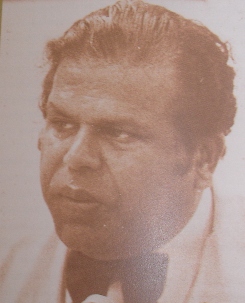Related Research Articles
Irene Jai Narayan was an Indian-born teacher and politician, who had a significant influence on politics in Fiji. She came to Fiji in 1959 after marrying Jai Narayan, a well known school Principal in Suva, and began her career as a teacher. She taught in DAV Girls School and MGM High School in Suva before entering politics.

Siddiq Moidin Koya was a Fijian Indian politician, Statesman and Opposition leader. He succeeded to the leadership of the mostly Indo-Fijian National Federation Party (NFP) on the death of the party's founder, A. D. Patel, in October 1969, remaining in this post until 1977. He later served a second term as leader of the NFP, from 1984 to 1987.

Jai Ram Reddy, CF was an Indo-Fijian politician, who had a distinguished career in both the legislative and judicial branches of the Fijian government. In 1998, he received Fiji's highest honour, the Companion of the Order of Fiji, in recognition of his services to his country.

General elections were held in Fiji between 19 March and 2 April 1977. As a result of a split in the ethnic Fijian vote, the ruling Alliance Party of Prime Minister Kamisese Mara suffered a narrow defeat. Although the Alliance Party received the most votes, it won only 24 seats, two fewer than the Indo-Fijian-dominated National Federation Party (NFP). One seat was won by the Fijian Nationalist Party, with the remaining seat going to an independent candidate, Osea Gavidi.

Early general elections were held in Fiji between 17 and 24 September 1977. They followed elections in March which resulted in a hung parliament and no party able to gain a majority. The new election resulted in a landslide win for the Alliance Party (Fiji) led by Prime Minister Kamisese Mara, which won 36 seats out of 52. It was aided by a split in the main opposition, the National Federation Party (NFP) and a decline in support for the Fijian Nationalist Party.

The National Federation Party is a Fijian political party founded by A.D. Patel in November 1968, as a merger of the Federation Party and the National Democratic Party. Though it claims to represent all Fiji Islanders, it is supported, in practice, almost exclusively by Indo-Fijians whose ancestors had come to Fiji between 1879 and 1916, mostly as indentured labourers. However, in the 2018 general election, the party recorded a considerable change in its support base due to the inclusion of more indigenous Fijian candidates.

Fiji's parliamentary election of March 1977 precipitated a constitutional crisis, which was the first major challenge to the country's democratic institutions since independence in 1970.

Western United Front (WUF) was an ethnically Fijian political party formed prior to the 1982 elections and contested the election in coalition with the National Federation Party . The party was in response to the disenfranchisement of indigenous peoples in the Western Provinces of Viti Levu as despite the presence pf major economic drivers of the country located in their areas they lack representation on the decision making table of the country.
Raojibhai Dahyabhai Patel was an Indo-Fijian lawyer and politician, who was better known as the younger brother of A. D. Patel. To distinguish between the two, he was generally referred to as R.D. A member of parliament from 1966 until 1976, he was Speaker of the House of Representatives between 1972 and 1976.
James Shankar Singh, MBE was a Fiji Indian farmer, businessman, social worker and politician who served as a Minister in the Alliance Government of Ratu Sir Kamisese Mara. Like many Fiji Indian politicians of the era, he joined the Alliance Party with a belief in mutiracialism, but was disappointed with the Alliance Party's appeal to Fijian nationalism after 1977 and left the Alliance to join the National Federation Party.
The Citizens Federation was the political expression of a predominantly Indo-Fijian trade union movement, and was a forerunner of the present day National Federation Party.
Davendra Singh was a Fiji Indian small businessman and politician who came into prominence when he challenged and defeated the official National Federation Party (NFP) candidate in a by-election in March 1985.

Karam Chand Ramrakha was a former Fiji Indian lawyer, union leader and politician, who served in colonial Fiji's Legislative Council and independent Fiji's House of Representatives from 1966 to 1982.
The Flower Faction was one of the factions of the National Federation Party (NFP) to contest the September 1977 elections in Fiji.
The number of Fiji Indians that could be elected to the Legislative Council was fixed over the years as follows:
Balwant Singh Rakkha was a Fiji Indian medical doctor and a member of the House of Representatives of Fiji representing the National Federation Party (NFP), but he is best known for his strong support for the former leader of the NFP, Sidiq Koya and the split caused within the NFP when he was rewarded by Koya for his loyalty by being given a seat in a constituency where he was a virtual unknown.
Unlike the majority of Fiji's Indian population, who are descendants of Indian indentured labourers brought to Fiji between 1879 and 1916, most of the Sikhs came to Fiji as free immigrants. Most Sikhs established themselves as farmers. Sikhs also came to Fiji as policemen, teachers and preachers. In recent years large numbers of Sikhs have emigrated from Fiji, especially to the United States, Canada, the United Kingdom, Australia and New Zealand. Sikhs in Fiji are generally referred to as Punjabis.
Ratu Julian Nasaroa Brown Toganivalu was a Fijian chief, civil servant and politician. He was a member of the House of Representatives for three days in 1977.
Shiu Narayan Kanhai was an Indo-Fijian teacher, trade unionist and politician. He served as a member of the House of Representatives between 1977 and 1982.